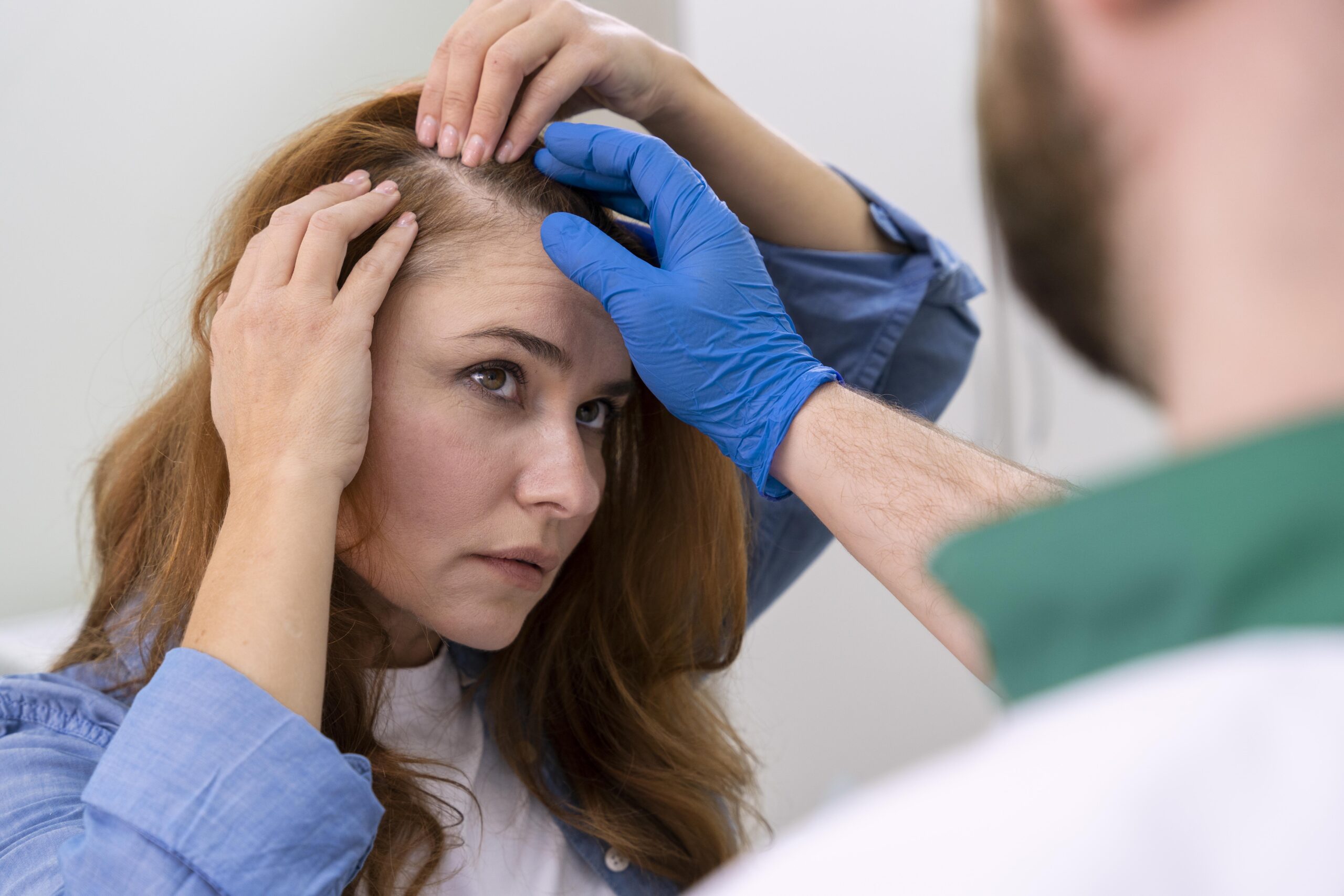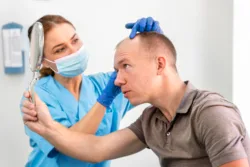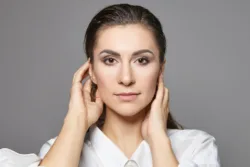Hair loss can impact self-image, as hair plays an important role in who we are and how we see ourselves. While some hair loss occurs every day, excessive hair loss might be concerning. It often indicates an even greater issue, which could be inherited or related to underlying health issues. For people who suffer from baldness or gradual hair loss, a hair transplant may be a game changer. In this blog, we will discuss the common causes of hair loss and when to consider hair transplant, symptoms, its benefits and causes.
What is Hair Loss?
Its also known as alopecia, is a condition in which a person’s scalp or other body parts such as hair density, thickness, or coverage noticeably decreases. It can impact anyone, no matter age or gender, and it can be gradual or sudden, temporary, or permanent.
Although 50 to 100 hairs falling out each day is typical due to the natural cycle of hair development, excessive hair loss could be a sign of a more serious problem that requires medical treatment. Several factors, such as hormone imbalances, stress, sickness, drugs, alcohol, and poor hair care habits, can cause hair loss.
Common Causes of Hair loss:
1. Genetic Androgenetic Alopecia
The most common type of hair loss is male-pattern or female-pattern baldness. It is genetic and usually develops gradually with visible patterns, including bald spots and a hairline that recedes in men or general loss in women.
- Men: First appears as crown thinning and temple recession.
- Women: Often see an increase of the portion line and a general thinning of the scalp.
Signs:
- Thinning gradually over several years
- A family history of baldness
- Smaller hair (short, thin hairs)
2. Medical conditions and autoimmune disorders
Hair follicles may sustain direct damage or the hair development cycle may be affected by specific medical conditions. An autoimmune disease called alopecia areata results in sudden, uneven hair loss on the scalp or other parts of the body when the body’s immune system unintentionally targets hair follicles. Hair thinning can also result from chronic conditions like diabetes and lupus that impact immune system function, inflammation, or circulation. If treatment is delayed, infections like the fungal infection known as hairline ringworm (tinea capitis) can harm the scalp and result in bald patches.
3. Lifestyle and environmental factors
Your daily routine and environment can also influence the health of your hair. For instance, exposure to pollution, UV rays, and harsh weather conditions may cause the scalp and hair to become dry. In addition, smoking weakens the hair follicles and reduces blood flow to the scalp. Moreover, poor nutrition, inadequate hydration, and lack of sleep can all negatively affect hair growth — ultimately leading to dull, lifeless strands that shed more easily.
4. Medications and medical treatments
It is a side effect of several medications and therapies.
As examples, consider:
- Chemotherapy targets cells, including hair follicles, that divide quickly.
- Medications for blood pressure
- Blood thinners, or anticoagulants
- Birth control pills and hormone replacement treatment are examples of hormonal drugs.
After stopping the drug, hair usually grows back, but not always.
5. Hormonal changes
Hormones have a significant impact on hair growth. Hormone fluctuations can cause thinning or losing by interacting with the hair development cycle. Important hormone causes consist of:
- Pregnancy and childbirth: Postpartum hair loss is a condition that can result from hormonal changes occur during and after pregnancy.
- Menopause: Similarly, menopause can lead to reduced estrogen levels, which may cause hair loss, particularly on the scalp.
- Thyroid conditions: Additionally, thyroid conditions such as hypothyroidism and hyperthyroidism — can contribute to patchy hair loss or overall hair thinning.
6. Poor nutrition
Poor nutrition negatively impacts hair growth which causes hair loss. Hair health can quickly be impacted by diet restrictions or poor nutrition.
Common factors associated with this condition are:
- Iron: One of the most common insufficiencies associated with hair loss.
- Vitamin D: Improves the proper cycling of hair follicles.
- Zinc: It helps hair growth and tissue regeneration.
- Protein: Improper eating of protein, or keratin, which makes up hair, might result in hair loss.
7. Stress
Stress, whether physical or emotional, can cause hair follicles to enter a resting phase, which results in telogen effluvium (type of hair loss), a kind of hair loss.
Signs:
- Surgery
- Raised fever or sickness
- Loss job opportunity or divorce
- Sadness
When to Consider a Hair Transplant
Hair follicles are surgically transferred from a donor site—usually the back of the scalp—to the areas that are balding or thinning. But when is the right time to consider it:
1. You can’t stop losing hair
Genetic conditions, such as male and female pattern baldness, cannot be treated through lifestyle changes alone. However, by using follicles that are resistant to thinning, hair transplants offer a permanent solution in these cases, effectively re-growing hair in bald or thinning areas.
2. Reduced scalp condition
When the rate of hair loss slows down, it is recommended to have surgery. After a transplant, new areas may continue to reduce if you’re still losing hair, which could produce uneven results. Better long-term results are ensured by first stabilizing hair loss with medication.
3. Your donor area is healthy
Strong, dense hair at the back or sides of your head (the donor zone) is essential for a successful transplant. Moreover, the quality of these hairs has a direct impact on the outcome, as they are utilized for grafting. However, weak or limited donor areas may reduce the chances of transplant success.
4. Medical treatment failed
If you have tried too many medical treatments but all these give negative results then hair transplants are considered.
5. You are good in physical and mental health
A good candidate is healthy generally, has reasonable expectations, and provides no significant risk to their health. Another key component for a positive result is being psychologically ready for the slow process of recovery and rejuvenation.
6. Hair loss affects you emotionally
A hair transplant can help restore not only your hair but also your emotional health if hair loss is affecting your self-image, confidence, or social anxiety.
Conclusion:
This concern is a common problem but the good news is that it’s frequently controlled or treatable. To find the best solution, whether it is medication treatment, lifestyle changes, or a surgical hair transplant ,starts with understanding the cause of the problem. If you are thinking about hair transplant treatment, please visit Aestheticure. Our best expertise and experienced surgeons will provide you with the best treatment and proper care.
For more information or to schedule a consultation, feel free to Contact Us!







